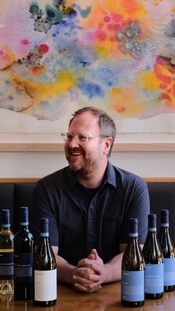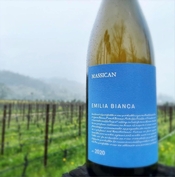The Napa Valley wine industry is rich with winemakers producing premium Cabernet Sauvignon as economics continue to drive the prominence of the variety. So, it was a thrill to sit down (via Google Meet) with winemaker Dan Petroski as he pushes the pendulum of Napa Valley wines toward white wines that combine the sunny Mediterranean with an intellectual appeal.
Petroski is the founder and owner of Massican, which serves as an ode to Mediterranean wines. Massican’s name comes from the coastal mountain range in Southern Italy. His entire production is white wines (and vermouth), producing several distinctive Italian varietals like Ribolla Gialla and Tocai Friulano that don’t often get  the attention they deserve and are seldom seen in Napa. His focus on white wines makes Massican the only all-white wine project in the Napa Valley.
the attention they deserve and are seldom seen in Napa. His focus on white wines makes Massican the only all-white wine project in the Napa Valley.
Petroski came to wine somewhat unconventionally after a successful career in publishing. In 2005, he traded in New York publishing expense accounts and power lunches to serve as an intern with the Valle dell’ Acate winery in Sicily — a move driven by his Italian heritage and affinity for Italian wines. Petroski explained that his time in Italy was, in essence, his second act in life (following the first of business and marketing) focused entirely on creativity and the art of learning a craft. He returned to the States to work in the wine industry, serving as a harvest intern and eventually landing the coveted spot as winemaker for Larkmead Vineyards in Calistoga.
While at Larkmead, he began his personal label, inspired by his time in Sicily and the beautiful, local white wines he would enjoy while overlooking the Mediterranean Sea. Petroski is now in his self-described third act, having left Larkmead recently and focusing solely on Massican.
The 2020 Massican portfolio consists of “Annia,” named for Petroski’s mother, a blend of 61% Tocai Friulano, 27% Ribolla Gialla and 12% Chardonnay and “Gemina,” a blend of 75% Pinot Bianco and 25% Greco. Petroski also makes a 100% Sauvignon Blanc, a 100% Chardonnay, and dry and sweet vermouth, inspired by a love of Italy’s aperitivio drinks. All of the Massican wines are piercingly pure, refreshingly crisp, and easy-drinking.
Sadly, the wines from Massican are not so easy to obtain, as currently only 3,000 cases are produced. The wines are primarily distributed directly to consumers via the Massican mailing list, and they are also distributed  to select retail shops across 14 markets. However, the shortage is slowly easing as Petroski seeks to increase production. As a first step, he will soon release a Whole Foods exclusive white blend named Emilia Bianca after his grandmother. It will ring up for $22, making it slightly more accessible than his other $30 bottlings.
to select retail shops across 14 markets. However, the shortage is slowly easing as Petroski seeks to increase production. As a first step, he will soon release a Whole Foods exclusive white blend named Emilia Bianca after his grandmother. It will ring up for $22, making it slightly more accessible than his other $30 bottlings.
Petroski doesn’t shy away from political discourse, which with him is as refreshing as his wines. His Instagram magazine tackles topical issues like fighting voter suppression. He’s also long been at the forefront of the climate crisis discussion in Napa. In response to my question asking if Napa has focused too much on Cabernet production and not on what the ground can best yield, he noted that the Cabernet phenomenon is relatively new, a direction Napa went in part after Robert Parker advanced the scoring system. Accordingly, he remarked that Napa vintners could pivot again to confront climate change by planting different grape varieties akin to Bordeaux, which has now expanded its list of permitted varieties. However, he emphasized that many in Napa remain short-sighted in their Cabernet reliance, given it is what fetches the highest price. Petroski noted it wouldn’t be until a Napa Touriga Nacional garners 100 points that the tide will turn. So, for now, Napa continues to plant more and make more Cabernet.
Petroski is also passionate about changing the perception of white wine in the U.S. and exposing those interested in something new to his wines. To do so, he is dipping his toes into myriad modern marketing approaches, including the Instagram magazine mentioned earlier and the introduction of a non-fungible token (NFT) – digital certificates of ownership and authenticity that can be applied to wine among other things. He has also recently launched an app with a white-wine emoji.
It’s the rare winemaker who modernizes white winemaking, tackles vital social issues, and introduces an endless array of innovative marketing approaches. Thus, it’s no surprise that he and his wines have a loyal following. I hope after reading this, you will seek out a bottle and join the growing legion of Massican enthusiasts.
 the attention they deserve and are seldom seen in Napa. His focus on white wines makes Massican the only all-white wine project in the Napa Valley.
the attention they deserve and are seldom seen in Napa. His focus on white wines makes Massican the only all-white wine project in the Napa Valley. to select retail shops across 14 markets. However, the shortage is slowly easing as Petroski seeks to increase production. As a first step, he will soon release a Whole Foods exclusive white blend named Emilia Bianca after his grandmother. It will ring up for $22, making it slightly more accessible than his other $30 bottlings.
to select retail shops across 14 markets. However, the shortage is slowly easing as Petroski seeks to increase production. As a first step, he will soon release a Whole Foods exclusive white blend named Emilia Bianca after his grandmother. It will ring up for $22, making it slightly more accessible than his other $30 bottlings. 